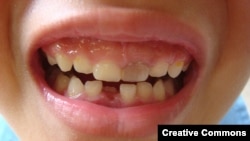Chinese scientists claim they have been able to generate new teeth from a strange source: human urine.
In a study published in the Cell Regeneration Journal, researchers from the Guangzhou Institutes of Biomedicine and Health say they were able to create induced pluripotent stem cells (iPSCs) from cells in human urine and coax them into becoming different cell types that mimic tooth components such as enamel, dentin, cementum and pulp.
Stem cells have shown great promise because of their ability to be made into many types of cells including heart cells and even neurons.
After culturing the iPSCs, they were mixed with mouse cells and transplanted into the mice’s jawbones. In three weeks “tooth-like structures were recovered,” but with only a 30 percent success rate.
While the experiment may offer hope for those who have lost teeth due to decay or injury, the teeth generated in the process were only about one-third as hard as human teeth.
Harvesting stem cells from urine avoids the controversy of using human embryonic stem cells, but Prof. Chris Mason, a stem cell scientist at University College London, told the BBC that urine does not make for a good source of stem cells and that it is prone to infection.
"You just wouldn't do it in this way,” he said.
In a study published in the Cell Regeneration Journal, researchers from the Guangzhou Institutes of Biomedicine and Health say they were able to create induced pluripotent stem cells (iPSCs) from cells in human urine and coax them into becoming different cell types that mimic tooth components such as enamel, dentin, cementum and pulp.
Stem cells have shown great promise because of their ability to be made into many types of cells including heart cells and even neurons.
After culturing the iPSCs, they were mixed with mouse cells and transplanted into the mice’s jawbones. In three weeks “tooth-like structures were recovered,” but with only a 30 percent success rate.
While the experiment may offer hope for those who have lost teeth due to decay or injury, the teeth generated in the process were only about one-third as hard as human teeth.
Harvesting stem cells from urine avoids the controversy of using human embryonic stem cells, but Prof. Chris Mason, a stem cell scientist at University College London, told the BBC that urine does not make for a good source of stem cells and that it is prone to infection.
"You just wouldn't do it in this way,” he said.





